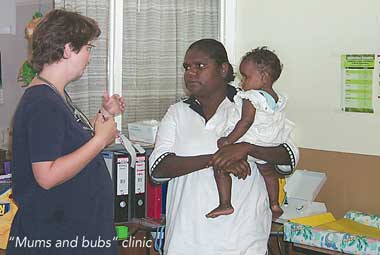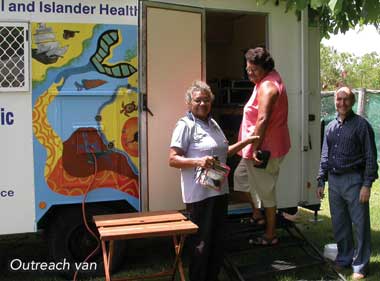Helping patients sort out the complexities of life, even if in small steps, can be a source of great satisfaction
Aboriginal community controlled health services (ACCHSs) across Australia are supported by predominantly non-Indigenous doctors. As of 2005, there were between eight and ten Indigenous doctors working in ACCHSs.

The practice of medicine in an ACCHS challenges even the most highly trained clinician. The number, complexity and interaction of problems presenting in any one consultation1 require listening skills, a depth of clinical knowledge, familiarity with evidence-based medicine, and the ability to formulate feasible management plans2 — and all these skills are needed all the time. A constant challenge is to tease out the subtleties in communication. Inherent in this is the ability of the practitioner to engage in empowerment strategies with Indigenous patients, and a big part of the job is advocacy on behalf of patients, helping them to negotiate parts of the health system compromised by institutionalised racism.3
There are two relevant aspects of cultural safety. The first is the more traditional view of cross-cultural communication;4 the second concerns the culture of being a doctor.
The recent history of Queensland Aboriginal and Torres Strait Islander communities, like those in Townsville, is one of loss of land (often accompanied by violence), forced removal, and detention of differing clans in missions and reserves, with consequent loss of culture, autonomy, identity and life skills. Many patients come from such traumatised family backgrounds.5,6 Dealing constantly with traumatised patients and the resulting problems of unemployment, poor education, substance misuse and violence can become a threat to the wellbeing of the ACCHS staff, especially the GPs.
The stressors of mainstream general practice — job demands, time pressures and perpetual change — are well known. These also affect GPs working for ACCHSs, but the strongest predictor of job satisfaction has been identified as being in control of the job.7 The major stress for GPs working for an ACCHS is the loss of autonomy in practice management. ACCHSs are governed by community-elected boards, who make many of the decisions GPs in mainstream practices would ordinarily make themselves. Some board members are highly trained in the health field, others are not, and their decisions may or may not be in line with GPs’ perceptions of how a medical clinic should operate. This lack of autonomy can make the implementation of change difficult when the ultimate decision for acquisition of equipment, recruitment, conference attendance, or participation in research and population health programs lies with the board. The stress is minimised if GPs enjoy good working relationships with their senior managers, chief executive officers and boards. Community politics may also influence some decisions, which can be difficult to comprehend until an understanding of the broader context of Indigenous control and empowerment has been gained.
While remuneration levels in some centres are improving, through support from, for example, the Rural Incentive Payments Scheme,8 GPs in the larger urban ACCHSs are often not as well paid as their mainstream colleagues. This reinforces the perception that the work they are engaging in is less valuable and has led to a high turnover of doctors and difficulty in attracting Australian-trained GPs. To attract and retain more Australian-trained doctors, a review of remuneration is needed.
- Kathryn S Panaretto1
- Mark Wenitong2
- 1 Townsville Aboriginal and Islanders Health Services, Townsville, QLD.
- 2 WuChopperen Health Service, Cairns, QLD.
- 1. Thomas DP, Heller RF, Hunt J. Clinical consultations in an Aboriginal community controlled health service: a comparison with general practice. Aust N Z J Public Health 1998; 22: 86-91.
- 2. Couzos S, Murray R. Aboriginal primary health care. An evidence-based approach. Melbourne: Oxford University Press, 2003.
- 3. Henry BR, Houston S, Mooney GH. Institutional racism in Australian healthcare: a plea for decency. Med J Aust 2004; 180: 517-520. <MJA full text>
- 4. Eckerman A, Dowd T, Martin M, et al. Binan goonj: bridging cultures in Aboriginal health. Armidale, NSW: University of New England Press, 1995.
- 5. Kidd R. The way we civilise: Aboriginal affairs — the untold story. Brisbane: University of Queensland Press, 1997.
- 6. Reynolds H. Why weren’t we told? A personal search for the truth about our history. Melbourne: Penguin Books, 1999.
- 7. McGlone SJ, Chenoweth IG. Job demands and control as predictors of occupational satisfaction in general practice. Med J Aust 2001; 175: 85-86.
- 8. Australian Government Department of Health and Ageing. Registrars Rural Incentive Payments Scheme. Available at: http://www.health.gov.au/internet/wcms/publishing.nsf/Content/pcd-rrips (accessed Apr 2006).





